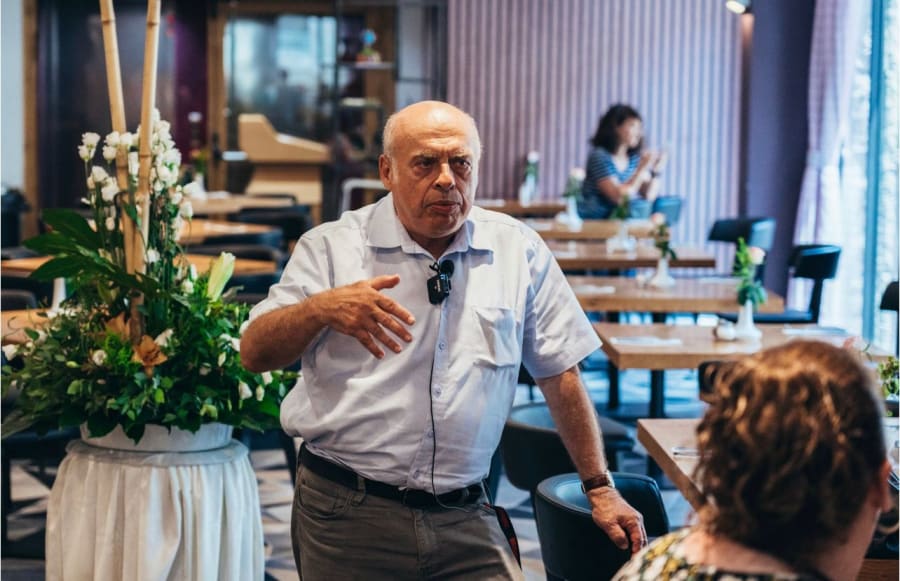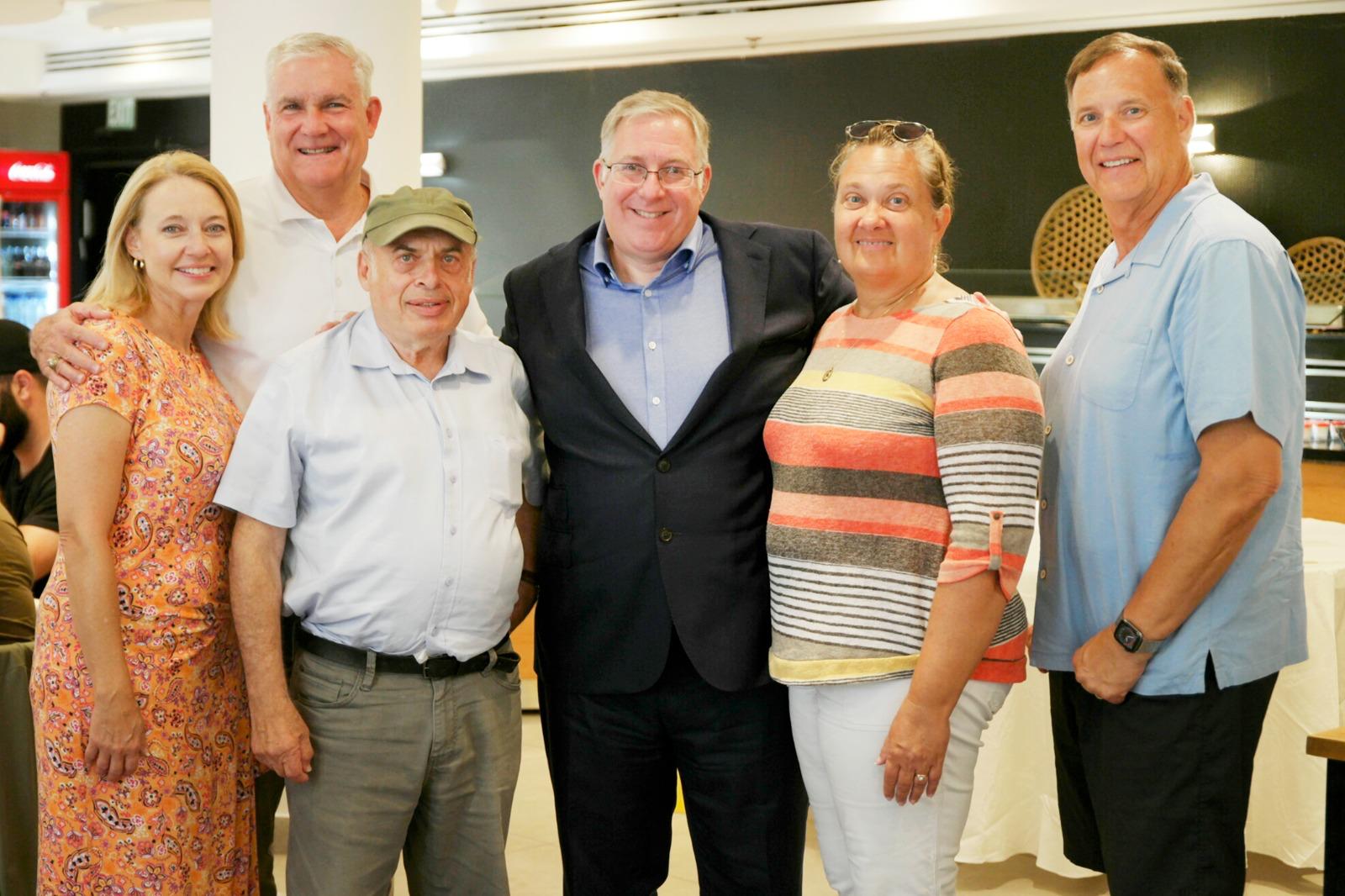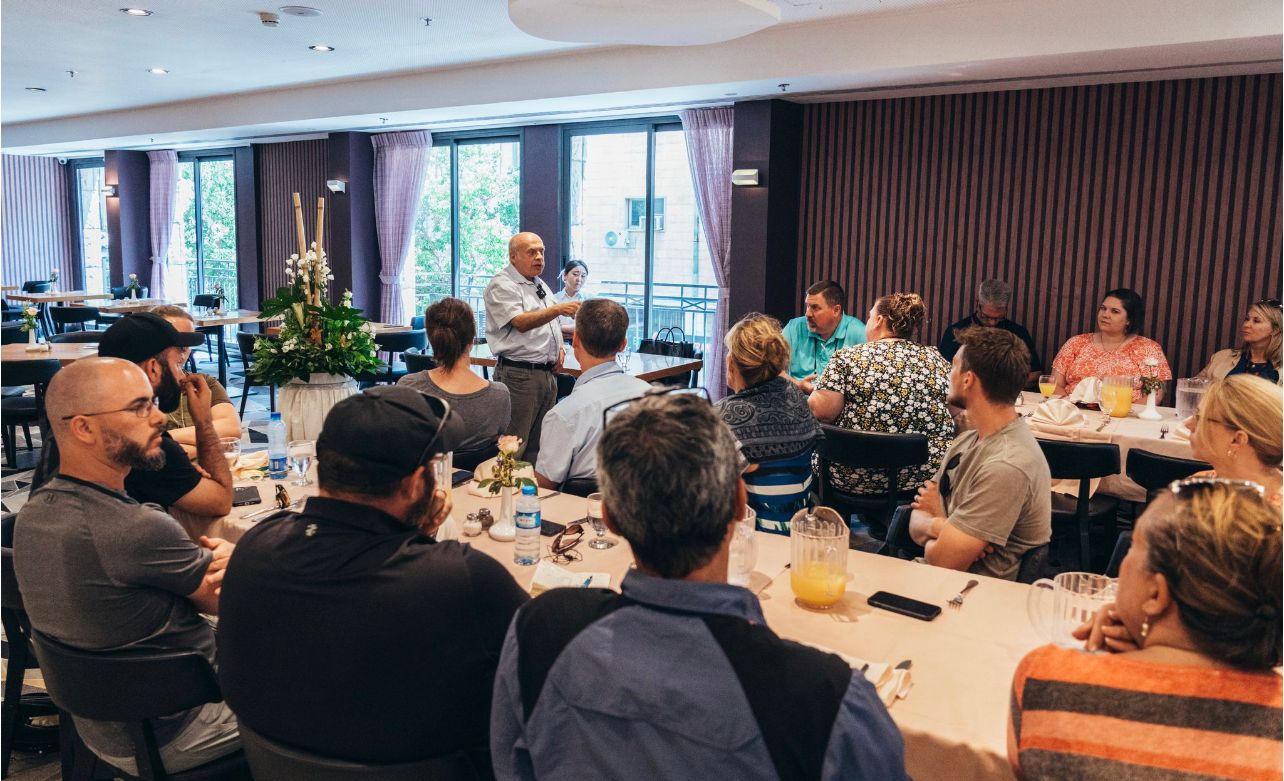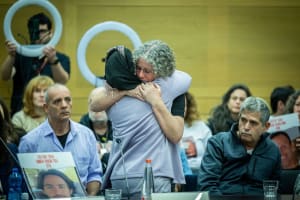Natan Sharansky warns Evangelicals that Putin vows to rebuild Russian empire, rule forever, and must be stopped
Over lunch in Jerusalem, former KGB prisoner tells pastors about former KGB chief he knows all too well

JERUSALEM, ISRAEL — An intense debate is underway in the United States over how to best deal with Russian President Vladimir Putin.
Despite the fact that Putin’s invasion of Ukraine has already left nearly 500,000 people dead, U.S. President Joe Biden seems determined to help provide Ukraine with just enough weapons and financial support not to lose and be completely overrun, but not nearly enough to help Ukraine actually win quickly and decisively bring the war to an end.
Former U.S. President Donald Trump doesn’t appear fully committed to Ukraine winning either.
During a town hall meeting on CNN in May, Trump expressed sorrow for all the deaths and said, as president, he could end the war in 24 hours.
But he specifically refused to speak in terms of defeating Putin and helping Ukraine win all of its land and freedoms back.
RAGING DEBATE IN U.S. OVER HOW TO HANDLE PUTIN
“I want everybody to stop dying,” Trump said. “They’re dying. Russians and Ukrainians. I want them to stop dying….I’ll have that done in 24 hours.”
“If you say he’s a war criminal, it’s going to be a lot tougher to make a deal to make this thing stop,” Trump said. “If he’s going to be a war criminal, people are going to grab him and execute him, he’s going to fight a lot harder than he’s fighting under the other circumstance.”
Trump also called Putin “a smart guy” who “made a tremendous mistake.”
When asked directly if he wants Ukraine to win, Trump replied, “I don’t think in terms of winning and losing.”
It’s a refrain echoed by other Republican presidential candidates, including Florida Governor Ron DeSantis and CEO Vivek Ramaswamy, both of whom have stated that they would stop giving weapons and arms to Ukraine, a war which they don’t see in America’s national interests.
Other GOP candidates like former Vice President Mike Pence, former UN Ambassador Nikki Haley, and former New Jersey Governor Chris Christie are arguing the opposite, that it is very much in America’s interest to help Ukraine win and Russia lose.
EVANGELICALS DIVIDED OVER WHO PUTIN IS AND HOW BEST TO CONFRONT HIM
In the midst of this raging national debate, Evangelical Christians are divided.
Instinctively eager to seek peace, some want to help Ukraine finish the job, while others want nothing to do with the war and fear deeper U.S. involvement could lead to American boots on the ground, or – God forbid – nuclear war.
Given this vitally important current discussion, as well as the biblical prophecies of Ezekiel 38-39 – which indicate that, in the “last days,” a Russian dictator will mobilize his military forces and build a multi-national coalition to surround and attack Israel – I thought it was important to introduce American Evangelical pastors to somebody who actually knows the current dictator of Russia.
SHARANSKY WELCOMES EVANGELICAL PASTORS IN JERUSALEM
It was, therefore, both a joy and honor recently to introduce Natan Sharansky at a luncheon in Jerusalem attended by a delegation of 40 young Evangelical pastors and their wives who came to tour Israel – many for their very first time – during the 75th anniversary of its miraculous and prophetic rebirth in May 1948.
Sharansky, a personal friend and hero of mine (whom I worked for briefly back in 2000), shared some of his personal story of growing up Jewish in Ukraine and Russia, becoming a human rights activist, and eventually being unjustly imprisoned in the Soviet gulag for nine years.
He shared the immense pressure he faced during KGB interrogations, the friendship he formed with a Christian pastor who was in his cell for a time, and the joy of being released from prison and allowed to immigrate to Israel to rejoin his beloved wife.

If that weren’t enough, Sharansky – one of the most trusted and famous Jewish men worldwide over the past half-century – talked about his nine years as a Member of Knesset, including serving as deputy prime minister) and nine more years serving as the head of the Jewish Agency.
He quipped that his nine years in Israeli politics were definitely the hardest of anything he’s ever done.
SHARANSKY KNOWS PUTIN PERSONALLY; HIS PERSPECTIVE ON THE RUSSIAN LEADER WAS SOBERING
On a more serious note, when I asked Sharansky to talk about the Vladimir Putin he knows, he did not mince words.
He wanted these Evangelical leaders to go back to the United States with a clear sense of how dangerous this murderous dictator really is.
He warned them that Putin wants to stay in power forever, wants to rebuild the sprawling Russian empire, and is willing to kill to achieve his vision.
It was a sobering and timely message, and a profoundly important one.
The delegation was organized and co-sponsored by The Joshua Fund – a ministry my wife and I founded 17 years ago to educate and mobilize Christians to bless Israel and her neighbors in the name of Jesus according to the Abrahamic Covenant – and Faith Wins, an organization that mobilizes American pastors and ministries to register all of their church attendees to vote, educate them about biblical issues and not be afraid to live their faith and speak the truth in love in the public square.
During their time here, led by Joshua Fund executive director, Carl Moeller, and Faith Wins executive director, Chad Connolly, they visited biblical sites across the Land, walked where Jesus and the apostles walked, took a boat ride across the Sea of Galilee, met Israeli and Palestinian pastors and ministry leaders, toured the Knesset, were briefed by various members of parliament, studying the scriptures, had times of worship and prayer, and lots of time of Q&A with my wife, my colleagues and me.
It was a powerful time of fellowship and one we’ll cherish forever, and for me, one of the highlights was letting the group spend a few hours with Natan Sharansky, hear his stories, learn from his perspective, and ask him direct questions.
Here is part of the transcript of our conversation about Putin (lightly edited for clarity).
I do hope you’ll read it in full and share it with family and friends on social media.

EXCERPTS OF MY CONVERSATION WITH NATAN SHARANSKY ABOUT VLADIMIR PUTIN
ROSENBERG: Natan, you’ve actually sat with Vladimir Putin. Most Americans haven't really thought much about him. And there's a movement among many conservatives and Evangelicals in the United States that Putin is not so bad.
You know him. You’ve met him. You spent time with him.
It’s ironic because you were a prisoner of the KGB and he was the head of the KGB.
In this book I gave you, ENEMIES AND ALLIES, I spent several chapters on him because not only am I not a fan, I think even Christians are not worried enough about him.
Would you say a little bit about who he is, who you know him to be?
NATAN SHARANSKY: Well, about Putin, I can speak a lot.
I met him a number of times when he was the head of KGB and then president.
Once he told me, “You know, I'm so frank with you and open, not because you are Minister of Israel, but because I read the transcripts of your interrogations.”
So, he thought it's like a big compliment that, “You were so strong in your interrogations, so I can rely on you.”
After 2005, approximately, I stopped meeting him and avoided meetings with him because it became too problematic for how I justify it to my human rights friends that I meet with this dictator.
But he went through transformation.
He was a KGB man who came to power through all types of controls, which he built through KGB.
But [at first] he seemed like a new type of a leader.
First of all, he was not anti-Semitic.
He is an awful war criminal. He is an awful dictator. He's not anti-Semite – meaning that he doesn't persecute Jews for being only Jews.
He explained to me, gave me stories, of how a Jewish family helped him in his difficult childhood. And they are all true, by the way.
But you know what? Many anti-Semites have their own stories about their Jewish friends. He happened not to be an anti-Semite.
He once said to me that, “I believe it was the biggest mistake of the Soviet Union that they decided not to permit Jews to have the life of their own communities, and that it is dangerous for the regime. I believe that Jews can be a good bridge for us with the West.”
And I have to say that many things that he said to me in the beginning were lies about Iran, and so everything was lies.
But what he said about that, he will permit the life of Jewish communities in Russia. It is true to this day.
So, no, he is not anti-Semite. But the world which he is trying to build is very bad for Jews and Jews [in Russia] realize it.
The leaders of Russia for 1,000 years, and practically everybody [in Russia], hated Jews.
At this time, Putin doesn't hate Jews, but he hates freedom.
He creates a world of his own control, and Jews are the first to feel it.
And they don't want to live in a world where they cannot say what they want.
But coming back to, “What happened with Putin?”
Putin in the beginning – and that's why he was meeting me, by the way – he was looking for recognition.
He was irritated by the fact that the free world didn’t recognize him as [the leader of] a superpower.
He knew that I have good relations with leaders in America, and [President George W.] Bush loves my books.
So, he thought that through me he will send a message, recognize me, accept me, respect me.
At some moment, however, I stopped being interesting to him.
Why?
Because he realized that he is the only eternal leader in this political world.
All these Bushes and what's her name – [German Chancellor Angela] Merkel – and the others, they can be in office four years.
Then they can be in for eight years.
And then they go, and Putin can stay forever.
He really built from the very first year of his being a president, he built a system like this that he will be in power forever.
First of all, he took care of the press.
Even those who were strongly supporting him, owners of the TV stations, he threw them away and he put in his own people.
Then he took care of the businessmen.
Any businessman who was good to him, but who was daring to give money to somebody else, he simply threw them away.
Then he took care of the courts.
Every judge has to remember who appointed him and for whom he has to work.
Then he changed the Constitution.
So, he is forever – not like all the others.
And as the only leader who is forever, he has to think about eternal values.
And he never made it a secret about what he wants.
He told even me that he believes that the biggest tragedy of the 20th century was the destruction of the Soviet Union by [Mikhail] Gorbachev and others.
I said [the biggest tragedy of the 20th century] was the Holocaust.
He said, “No – of course, for you Jews, it was a big tragedy. But globally, in the world, the fact that the Soviet Union was destroyed, that is the biggest tragedy.”
For him, he sees the greatest leaders – and wants really to continue on like them – was [Czar] Peter the Great and [Czarina] Katarina the Great and [Soviet leader Joseph] Stalin.
And now, he feels that it’s guaranteed that he's not like all the other leaders [in Western democracies] who are speaking, speaking, speaking against him and then disappear.
Instead, he is certain that is the one who will not disappear.
And his aim is now to rebuild the Russian empire.
He started doing it quietly.
He started by invading the Caucasus and Georgia.
And all the time he was checking the reaction of the West.
Georgia was a surprise for him. He invaded and took more than 20% of Georgia, but he had to retreat a bit.
Still, the world accepted that 20% was his. He only had to sit quietly.
And, of course, then there was Chechnya.
Then Belarus became his puppet.
But the biggest challenge, of course, is Ukraine.
Putin understood that he could not just take it.
He had to wait for the moment of weakness of the West.
And this moment of weakness came with [President] Obama’s making, when Obama told the Syrians not to cross the “red line” and use chemical weapons in 2014 [but Obama never followed through on defending the red line when it was crossed.]
You remember – and then Putin did two things.
First, he sent Russian troops to Syria and created a Russian military base. That's the reason why Israel has to be very careful with Putin today because this base controls all the airspace of Syria.
Second, he invaded Crimea.
When I said to [Secretary of State Tony] Blinken that, “You are aware that [Putin invaded Crimea, the southern portion of Ukraine] because of Obama's policies in Syria?
Blinken agreed that [Obama’s policies in] Syria were a big mistake and said, “We lost Syria because of this.”
But Blinken denied that it was because of Syria that Putin invade Crimea was because of this.
Of course, Putin didn't go immediately to Crimea [after the red line incident]. He was testing for weeks. Every day he was testing what would be the reaction of the West. And he could discern what the reaction of the world would be – more words, more words.
So, he conquered Crimea and started his war in Donbas.
Putin was afraid still to go to war fully against Ukraine because he was afraid of the reaction of the world.
But then there was the retreat of America from Afghanistan and the way and how it was done, how all the TV of the world was showing how America was running away and cannot save, protect the citizens who help them to Americans.
Then some people in the Kremlin told to Putin – they didn't even have to, he didn’t need somebody will tell him – “Now it is clear that for the next ten years, America will not do anything.”
That’s when he decided that the time to start the war against Ukraine – and he believed that, first of all, he believed that really what he said, that Ukraine is not a nation.
“Well, they will not be happy, but they will not really resist. Why should they resist? There are no national values there. They will not resist.”
So, Putin really believed that in three or four days he would reach Kyiv [the capital of Ukraine].
And he believed that he is the only leader in the world who is ready to threaten to use nuclear war.
He doesn't need to do anything with that threat – just threaten nuclear war, and the world will do nothing.
And he made some statements and he organized a test of nuclear weapons just a few days before and so on.
So, for a few days, it seemed that it was working.
And I was really scared when America started showing these signs of fear, if you remember, in the very first days.
Every year America is making tests of the Minuteman [nuclear-armed] missiles to make sure that they are still working. Every year they do it.
But they canceled [those tests] in order not to increase, not to be responsible for, increasing tension when Russia already started the invasion.
I remember I called the American ambassador here [in Israel] and said, “You're crazy. Please tell my opinion to the State Department because if you wanted to send a message to Putin that his tactics of paralyzing the world by threatening with nuclear war will work, that's what you just now did.”
But first, the Ukrainians proved that their national spirit is something very strong that Putin didn't really appreciate it.
They really know what to fight for.
They fought for their right to be free people in their own land.
Second, Putin also didn't realize how corrupt his army was and how weak it was.
And third, he didn't realize that at some moment when the free world will understand the threat to them and they really mobilized and overcame their fear.
And that's what happened.
So, look, it's not a rosy situation.
Ukraine is paying a terrible price.
America, on one hand, helps.
On the other hand, sometimes it seems that [President Biden] deliberately decides to do things much later than it had to be done.
When I first spoke in Washington in the first month of the war about [providing Ukraine] tanks and airplanes, they said, “What? They have great tanks. We are discussing whether to give missiles with a 50-mile range or 60 miles. What will irritate Putin?”
A few months later, [Biden] made a decision to give their airplanes [fighter jets].
He made this decision a few months ago.
It was a huge decision.
I happened to be in New York with Garry Kasparov [the Russian grandmaster chess champion], and we celebrated together this decision.
But now it's clear that they [Ukraine] will not be able to use them before December.
So, you have to understand that in the meantime, there is a very tough struggle.
And though in every battle, Ukraine has an advantage because of its spirit, and because of American artillery and so on, but the airspace is fully controlled by Russian jets because Ukraine doesn't have [those American fighter jets].
So, it's a difficult struggle.
I believe – I always believed and I believe that now – the free world will win because it's really a fight for the future of the free world.
In a few more serious victories by Ukraine, Putin will be very weak.
Then he will be overthrown by his own army because there is no chance for a big dictator to control the country.
At the moment that he is weak, then he will be overthrown.
It doesn't mean that there will be democracy in Russia.
No, there are no civil institutions built [to enable a true and healthy democracy to emerge post-Putin.]
But [once Putin is overthrown], the war will stop because it's a war of one person.
Nobody has any invested interest in this war except Putin himself.
But it's a very important struggle.

Joel C. Rosenberg is the editor-in-chief of ALL ISRAEL NEWS and ALL ARAB NEWS and the President and CEO of Near East Media. A New York Times best-selling author, Middle East analyst, and Evangelical leader, he lives in Jerusalem with his wife and sons.






